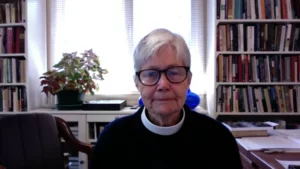Something Like an Introduction
To begin, an anecdote: I was asked recently to referee a paper for a philosophy of religion journal. I ended up declining to review the paper because I knew who its author was, but I did read it. I’ll not name the author here, of course, but I will tell you: the author is more intelligent than I am, more accomplished, and has forgotten more about philosophy and philosophy of religion than I’ll ever know. More than that, the author is, by all accounts, a committed and evangelical Christian. From reading the paper (and from what other things I know about this scholar), the author is committed to her/his work being biblically faithful, where “biblically faithful” means something like: either explicitly taught by, consistent with, and/or an implication of the teachings of the Christian Scriptures. Even still, this scholar proceeded to engage in one of my pet peeves with respect to the Bible—a pet peeve of mine I take it that Dru Johnson, our symposium’s “host,” if you like, might also find particularly vexing: flat-footed and woodenly interpreted Bible passages used for proof-texting.Johnson expresses similar worries in the paper to which I’m responding. It’s the sort of scriptural usage that Johnson takes to be “the lowest form of philosophy that Christians can do.” I’m sympathetic to the sort of disdain Johnson expresses here. Biblical texts were marshaled without the faintest hint of exegetical explanation, consultation with recent biblical scholarship, and the like. Even though the philosopher in question is not a biblical scholar, the author proceeded to make a complicated philosophical argument purporting to show scriptural evidential support for a number of key premises. Yet none of this purported evidence was supported by the deliverances of expert research. I take it that the author supposed that her/his reader simply could read the relevant passage in her English translation and just see that the passage reinforced the author’s philosophical argument.
Why do I begin with this anecdote? Because it highlights what I take to be a disease that infects my evangelical tribe. In the pages of leading philosophy of religion journals, philosophers consistently deploy misinterpreted and naive readings of biblical texts—without the slightest appeal to biblical experts—to drive home key premises to complicated arguments. Here’s an example, one for which the instances are legion: Genesis’s pronouncement that humans are made “in the image of God” is used to argue that a human is most fundamentally a minded, rational, or immortal being. You know, because being an “image” of God is to be ontologically like God, who is often understood to be minded, rational, and immortal (or their analogues). Interpreting the passage this way does have support in the Christian tradition. In the halls of the great tradition, Augustine’s voice is one that echoes loudly here.See, for example, Augustine, On the Trinity, in Nicene and Post-Nicene Fathers, Vol. 3, edited by Philip Schaff (Buffalo: Christian Literature Publishing Co., 1887), rev. and ed. for New Advent by Kevin Knight, Book IX, http://www.newadvent.org/fathers/1301.htm. Augustine argues that there’s a triune shape to the human mind in its memory, intellect, and will that points to the triune nature of the one God, and this is in what the image of God consists. Augustine is not the thinker who began this sort of line of reasoning, though. Before him stands, for example, the Cappadocian Fathers. See Jaroslav Pelikan, Christianity and Classical Culture (New Haven: Yale University Press, 1993), 121ff. Importantly, however, the recent deliverances of biblical scholarship on this matter says almost universally otherwise. Over the last fifty years, there’s a near consensus about what “image of God” means.J. Richard Middleton, The Liberating Image (Grand Rapids: Brazos, 2005), 25-27; F. LeRon Shults, Reforming Theological Anthropology (Grand Rapids: Eerdmans, 2003), 175 and 232; James T. Turner, Jr., “How to Lose the Intermediate State without Losing your Soul,” in Christian Physicalism? Philosophical Theological Criticisms, edited by R. Keith Loftin and Joshua R. Farris (Lanham: Lexington, 2018), 273. And it doesn’t mean what Christian philosophers often—too often—take it to mean.For a more biblically sensitive argument from imago Dei to these sorts of traits, including the fundamentally immaterial nature of the human person, see Joshua R. Farris, On the Soul of Theological Anthropology: A Cartesian Exploration (New York: Routledge, 2017). Now, that there’s anything like a consensus about an academic finding is quite a claim; in academic circles, it’s difficult to find consensus about anything. When there is one, scholars who wish to borrow from the discipline in which there is a consensus about a particular matter ought to pay attention to the consensus, and not be cavalier in their use of information that’s not been properly vetted and researched. Yet, Christian philosophers continue to parrot outdated readings of Bible passages without reference to what the experts in the discipline of reading the Bible have to say. This seems to me to be a major problem. It’s the height of irony: many in my academic and ecclesial tribe—including me, I’d wager—fail to take seriously the very Bible we purport to hold as the norma normans of our theological claims and our most ready-to-hand source of divine revelation. And we demonstrate this failure insofar as we fail to do our research. We do this insofar as we fail to pay attention to the expert analysis and insight of biblical scholars.
By contrast, philosophers—both Christian and non—do not fail to pay attention to expert analysis when working with the deliverances of modern cosmology and physics. Philosophers consult the deliverances of physicists when working on philosophical areas that dovetail with physics (e.g., debates in the philosophy of time). As well they should! Most philosophers aren’t formally trained in physics (some are, of course: Hans Halvorson is a notable Christian example). Philosophers consult those who know how to read and interpret scientific research so that they don’t write ignorantly of the deliverances of that research. In peer reviewed published works, Christian philosophers don’t routinely deny Big Bang Cosmology, for example. Instead, philosophers depend on secondary sources when it comes to these sorts of matters. I submit that this is the exact same stance the philosopher and theologian (whether analytic or not) should take to the biblical text and to its expert readers. Yet, speaking generally, this isn’t what’s happening.
As I mention above, I think that Dru Johnson and I will agree on this much, though he might wish I say more about the philosophers themselves training in specialized biblical scholarship. But what I say above captures my general approach to the use of Scripture in theological and philosophical work.For example, see Joshua Mugg and James T. Turner, Jr., “Why a Bodily Resurrection? The Bodily Resurrection and the Mind/Body Relation,” Journal of Analytic Theology (5) (2017): 121-144; and James T. Turner, Jr., “Temple Theology, Holistic Eschatology, and the Imago Dei: An Analytic Prolegomenon” TheoLogica 2, no. 1 (2019): 95-144. Johnson, though, wishes philosophers to go further. He argues—in the symposium paper, anyway—that Christian philosophers should make philosophical arguments by starting with the philosophical perspective of Scripture or “in tandem with the intellectual world of Scripture.” By my lights, this is asking too much of the Christian Bible and Christian thinkers, reasons for which I’ll give in what follows. For space reasons, I have one argumentative section, viz., (§II). In it, I’ll cast doubt on Johnson’s suggestion that there is the philosophical perspective of Scripture and the intellectual world of Scripture. In the final section (§III), I’ll briefly conclude. But, before I turn to argument, I note here my agreement with Johnson in the goal of getting Christian thinkers to take more seriously engagement with the biblical texts, treating them as they ought to be treated and not marshaled as though they are a simple and obvious collection of books filled with disjointed sentences to be used as isolated proof-texts of a given particular philosophical and/or theological position. Because Johnson and I share at least this much, and given that he’s much more knowledgeable about the whole of Christian Scripture than I am, I offer in what follows a tentative push-back, open to correction.
Pushing Back: The Philosophical Perspective of Scripture?
Johnson argues that Christian philosophers ought (1) to begin their philosophical thinking with the philosophical perspective of Scripture or else (2) do their philosophical thinking “in tandem with the intellectual world of Scripture . . . ”My arguments that follow aim only at Johnson’s symposium paper. I will admit that, on the face of it, (1) and (2) have some intuitive purchase. The Christian Bible is, though a set of discrete books, one continuous story that leads to Jesus and the New Creation. At least, that’s my evangelical take on it. And so, if I polled my local evangelical church on whether the congregants believed that the Bible has a particular, threaded, and discernable approach to philosophical questions, and a common thought-world, I wager most congregants would (if they understood the question) respond positively. And Johnson asks us to think likewise: the biblical literature—he implies—has a “coherent, sustained, and discernable thread of second-order thinking.”Does the Christian Bible have a unified metaphysic of the human person that allows for life after death? Given that he thinks (1) and (2) are true, he should ask us to think there is this discernable thread. After all, a necessary condition for one to be able properly to do (1), at least, is that there be a unified approach to philosophical questions shot through the whole of the Christian Bible. But this strikes me as implausible.
Consider the case of life after death. Does the Christian Bible have a unified metaphysic of the human person that allows for life after death? Do its human authors even have a unified way of thinking about life after death? In my own work, borrowing from exegetes such as Philip S. Johnston, Richard Longenecker, Jan Bremmer, N. T. Wright, and the like, I’ve argued that views about life after death develop—quite substantially—from the Pentateuch to the robust resurrection hope in the New Testament.Note: I don’t think the Pentateuch teaches anything that opposes the New Testament’s teaching of the future bodily resurrection. For that matter, I don’t think it teaches anything that opposes what, for example, the OT prophetic books teach concerning the future bodily resurrection. James T. Turner, Jr., On the Resurrection of the Dead: A New Metaphysics of Afterlife for Christian Thought (New York: Routledge, 2019), chp 1. Part and parcel of the development of a more robust account of life after death is the development of terminology and concepts that allow for more robust notions of life after death—owed in some part, it seems, to the Hebrew Bible’s run-in with the Greek language. It just is the case that, after the Greek translation of the Hebrew Bible, and during the intertestamental period, notions of a robust account of afterlife (roughly beginning to map onto philosophical anthropologies that look a whole lot like Platonic forms of substance dualism) begin to pop up in Second Temple Judaism, evidence of which one can see in how various NT authors approach the question of life after death.
My skepticism about (1) in light of what I’ve said about changing afterlife beliefs in the Bible betray my skepticism about (2), too. For, in my view, it’s just not the case that the thought world of the Pentateuch—at least, about the issue of life after death—is the same thought world in which, say, St. Paul lived and wrote. It seems to me that Paul argues vigorously and clearly about the hope of a bodily resurrection. In the Pentateuch, by contrast, there is at best a mere shadow of a hint of the coming resurrection: Exodus 3:6. This is the passage in the Synoptic Gospels from which Jesus argues for the truth of the bodily resurrection. But that Exodus 3:6 is, in part, about the future resurrection is something that (a) seems completely to have escaped the Sadducees’ notice (even Sadduccean biblical scribes, one might imagine) and (b) shocked everyone else standing around (Pharisees? Essenes?), some of which might have had more developed views of the afterlife than did the Sadducees (see: Mark 12:18-27; Matt. 22:23-33; Luke 20:27-40).See for example, N. T. Wright, The Resurrection of the Son of God (Minneapolis: Fortress Press, 2003), 415ff; Richard Bauckham, “Life, Death, and Afterlife in Second Temple Judaism,” in Life in the Face of Death: The Resurrection Message of the New Testament, edited by Richard N. Longenecker (Grand Rapids: Eerdmans, 1998), 88; Peter G. Bolt, “Life, Death, and the Afterlife in the Greco-Roman World,” in Life in the Face of Death: The Resurrection Message of the New Testament, edited by Richard N. Longenecker (Grand Rapids: Eerdmans, 1998), 67; Matthew R. Malcom, Paul and the Rhetoric of Reversal 1 Corinthians (Cambridge: Cambridge University Press, 2013), 251ff. More importantly, I’m struggling to conceive of an argument for the conclusion that Moses (or whomever cobbled together the Pentateuch) had any idea that Exodus 3:6 makes a case for a robust kind of life after death. All of the evidence of which I’m aware makes an exactly opposite case for what a Hebrew conception of the afterlife was at the time of Moses (and much later, for that matter).For one excellent study, see Philip S. Johnston, Shades of Sheol: Death and Afterlife in the Old Testament (Downers Grove: IVP Academic, 2002).
One push back here might be this: I’ve conceded that there is a hint of the future bodily resurrection present in the Pentateuch (I’ll admit, too, that I think resurrection beliefs become more pronounced in later books of the Old Testament, e.g., Ezekiel 37). Doesn’t this admission show that there’s a clearly discernable thread of philosophical thought about the afterlife in the Bible?
The answer to this seems to me to be “no.” Here’s why: at best, the One who knows and “thinks” in this unified way is the Divine Author. But God is no philosopher; He’s not engaged in second-order thinking. Or, at any rate, if the classical conception of God is true, God’s not engaged in second-order thinking. The only ones, then, that second-order thinking can apply to—in this matter—are the human authors. And they’re not doing this in a unified/coherent way about life after death (and its ancillary philosophical issues) throughout the whole of Scripture; at least, this is what the evidence (of which I’m aware) suggests. Since they’re not doing this about a central issue to the Christian faith, I’m skeptical that there exists an overarching unified philosophy and/or philosophical approach apparent throughout the canon of Scripture.And which canon is it that Johnson’s saying contains this philosophy? Is it the Protestant canon alone? If so, why? Does he think that the same philosophical method is consistently woven through the Roman Catholic canon? I’d be interested to know, but perhaps this is for another time and place.
A Quick Conclusion
Dru Johnson is correct: failing to be biblically sensitive—when Christian scholars use the Bible in their philosophical and theological discourse—is a critical methodological failure. And he rightly puts Christian thinkers on notice to take better care with and to pay better attention to the complex literature of the Bible. But I think he’s incorrect to go as far as he does. Though there surely are philosophical positions advanced in parts of the Scriptures, I’m skeptical that there is a sustained philosophy or philosophical method in the whole of Scripture. To argue for this, I put forward a (seeming) counter example to Johnson’s claim: the development of the metaphysics concerning life after death recorded in the Christian Scripture.
####
These essays were originally presented at an Evangelical Philosophical Society panel at the 2017 Annual Meeting of the American Academy of Religion.








Comments
Be the first one to make a comment!